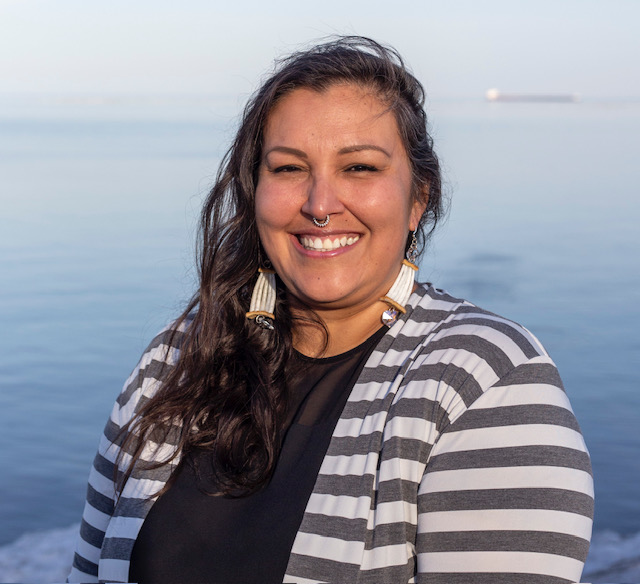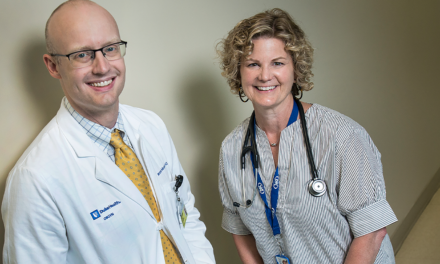2023 “Diversity in Politics” coverage was made possible by Women Winning, which builds a coalition of pro-choice people of all backgrounds, identities, and political affiliations to run for public office.
“I went to a few Duluth city council meetings. I looked at all the city council members — they all bring something to the table, absolutely — but it didn’t represent all of Duluth. One of my motivations for running was: representation.”

Miranda Pacheco is the only Indigenous person running in the November 7 election to represent Duluth
When Miranda Pacheco is door-knocking in Duluth for two city council at-large positions on the November 7 ballot for election this year, she has a unique connecting point with some voters.
“There are mothers who say, ‘My son is an active user right now.’ You can see the pain in their face. We need to do better for our community — [we need] leaders who realize that not everyone is doing great, you know?”
In March, Pacheco had just finished probation. She learned that her right to vote and run for office was restored. A friend who is politically connected encouraged her to run for city council. “Without hesitating I said yes,” says Pacheco. “I know my values. I care about community and believe that everyone has an equal shot [to contribute].”
Pacheco wants to bring a voice to the table that not only recognizes the addictions that many families in Duluth are facing, but also the prevalence of homelessness — another issue that Pacheco has lived through.
“We are in a housing crisis,” says Pacheco. “People can’t find affordable housing. At first, I became a candidate because I was thinking about people that are experiencing homelessness. As an alcohol and drug counselor, I work with people every day that don’t have a place to lay their heads. They come in with their whole life in bags. We need to do better.”
The 2022 data released by St. Louis County showed that 606 individuals were experiencing homelessness issues, with 234 people not finding shelter in the Duluth area on any given night. A representative from the CHUM Warming Center — which offers food and emergency shelter to the unhoused community in Duluth — told a local Fox21 news reporter that a majority of people coming to the center live with a physical or mental disability, a developmental disability, or a chronic substance use problem.
An Example of What Community Can Do
Pacheco moved to Duluth in 2015, after living in various Minnesota communities, to make a home and “build something.” Now she is a homeowner, living with her teenage daughters, with an adult son living nearby. She works as an alcohol and drug counselor at Mash-ka-wisen Treatment Center. She is a consultant for Wealth Entrepreneurship Economic Sustainability and has worked on the Zeitgeist Healthy Hillside Initiative.
Pacheco says that getting onto her feet required resources from many different places, such as a domestic violence shelter, addiction programs, and services to help people become homeowners. “If we’re in survival mode, change doesn’t happen. Getting my first job at the homeless shelter, and then with domestic violence survivors — it was meaningful work. I rented, saved money, built credit, got into school. I want to give more people hope that ‘you can do it, too.’”
She hears pushback from people, including those in political leadership, who believe community resources equate to “handouts.” “I don’t understand that. … You’re asking people to vote for you, and you want to make decisions for them, but you don’t want to care about them? I don’t get it.”
Pacheco says she has learned a lot since March, when she knew nothing about how to run a campaign. “The high has been the confidence that I’ve found in myself, knowing that people in Duluth believe there can be leaders like me, with lived experience. I was terrified in the beginning. I didn’t want to say that I’m a felon, but people recognize that I have a strong background. So, I just let it all out. Nobody can dig anything up about me because I lead with my story — that’s my strength.”
Her website starts off with these words:
In Duluth I also connected with my roots and started attending Ojibwe ceremonies, and I met and was adopted by Skip and Babette Sandman. I earned my associate degree from Fond du Lac Tribal College, and I’m earning a Social Work degree from St. Scholastica. While I beat the odds, I have seen the ways that we are failing people in need. My brother could not get the care he needed, and we lost him to suicide three years ago. When members of our community are lost to deaths of despair, when they turn to crime, or when they are forced out onto the street, we all suffer.
I believe we can do better.
Obstacles to Running For Office
The difficulties of being a political candidate with a modest income, raising children while working a full-time job, is something that regularly comes up in Changemakers Alliance “Diversity in Politics” conversations. When political representation is only from people who have flexible work and home responsibilities, and expendable income, the decision-making about what investments are made into community resources can be distorted.
Although the campaign life balance is difficult, Pacheco says she enjoys discussions she has with Duluth voters.
“In one conversation, we were talking about grief. This guy had just lost his wife,” she says. “I’ve also talked to people that are not struggling financially — people who are doing okay — and they want better roads, they want their property taxes lowered. One woman I talked to was retired and her property taxes keep going up. She was considering leaving Duluth because of that, but her kids are here.
“We have to figure out a solution to the fact that living is not affordable for too many people. One woman with a college degree told me she is living with her dad because she cannot find affordable housing. Rents are up, food prices are up — everything is up except wages. We can do something.”
She wants to be part of the team that decides what priorities to invest in.
Pacheco sees mental health care as another key issue. “I think we’re getting there. We have a crisis response team, through local mental health organizations, that are helping to respond to 911 calls — these are the partnerships that get people the best care.”
Pacheco says that when she was on the other side of the law, she “felt like I wasn’t seen, and I wasn’t heard. Now I can do that for myself and for others — for other brown women, for other felons, for other people in recovery, for other working-class people, for single moms.”







